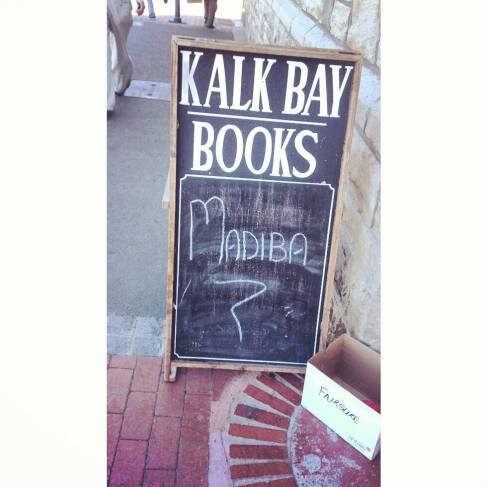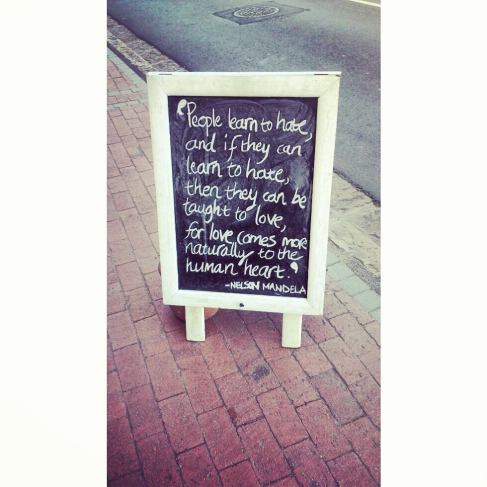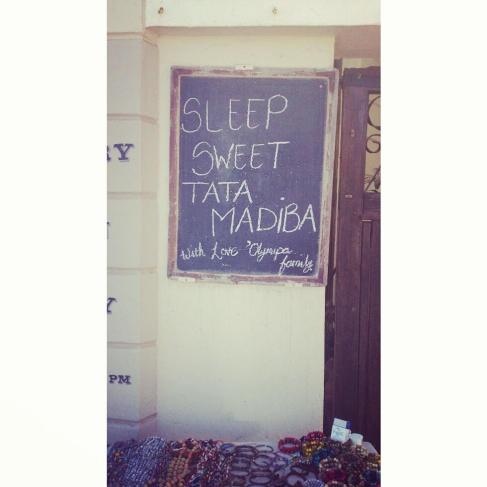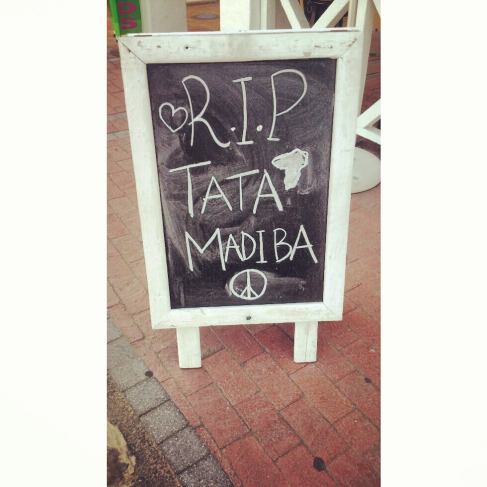Today I brought the family to the Cape of Good Hope and we stood on what seems to be the edge of the world for a little while.
For years I have sat at my Nana’s kitchen table and gazed, bewildered, at the world map on her wall. For years I have fixed my eyes on the label, ‘Cape of Good Hope’, and pondered what a place that must be. It is truly very beautiful. Nelson was the father of an incredibly breath-taking land.
Pitched up along the seafront street of Kalk Bay today were a number of chalkboards paying respects to Mandela.
I think I might have expected the country to erupt or cease to exist when Mandela died. Instead, the reality was that it kept on going. I made a point of listening to the radio as we drove along the roads today, to try to catch something of what the people are feeling. President Zuma spoke, explaining that Mandela’s was a life ‘we must all emulate for the betterment of our country and Africa.’ Songs were played. Songs like ‘What a wonderful world’ – which all seemed to have claimed some new and higher significance in the wake of the country’s great hero.
Janina text me this evening to tell me about a memorial service being held in Cape Town – unfortunately the text came too late, and we were too far away to attend – and exclaimed that they were about to sing the national anthem. It must have been an incredible experience. To join with the nation and sing. And this nation can sing.
I don’t know enough to form some long and intelligent and fresh opinion or thesis on Mandela’s death. I didn’t live through apartheid. As long as I have been alive, Mandela has been a free man. (We are headed to Robben Island on Sunday – a trip that will be of greater value now, I hope. I do wonder what the atmosphere there will be like.) Even having lived in South Africa for 3 months now, I don’t feel as though I know enough about this country to comment or possibly predict what’s next. It is such a vast land. It is home to over 52 million people. (Northern Ireland homes 1.8 million.) Having talked to the inmates at Malmesbury prison last week about their country, I know that President Zuma is not best liked here and has proven to be yet another corrupt politician. So the Black governing party which Mandela envisioned has not become a reality as yet. While we may fill the news feeds of our social media sites up to the brim with Mandela quotes, there is no doubt that his words have not yet been manifested in the leadership and citizenship of this country. The concern lies in the extent to which South Africans will strive to live out Mandela’s words now that he is gone. The risk is that they will become excessively quoted words, once seen as visionary and within reach, and eventually the remnants of a dreamed up future for this nation.
These past two days we have been staying in a little thatched cottage in Noordhoek – just 30 minutes from the Cape of Good Hope. Tucked behind a remote-controlled gate, it doesn’t take a top pair of binoculars to see that one could very easily live here and remain very oblivious to the happenings of South Africa. It is a very white-washed – when I say ‘white-washed’, I mean White – gated community. Each time I’ve driven out of the gate, I’m met by a new pair of horses trotting along the country lanes, being driven by their smiling White owners. It maybe isn’t a surprise at all, then, that I didn’t find the expected upside-down and mourning community outside the gate today. Without the aid of instantaneous news and social media, one would have to drive for a few miles to learn of Mandela’s passing. It’s on a day like today that I so wish I could be in prison, hearing the reactions of the inmates to such an event as this.
Prison closes its doors to outside visitors such as the Andrew Murray centre on December 15th. This closure lasts right through until January 15th, as part of a procedure known as Operation Vala. Vala occurs annually, as this period is recognised as the Summer holiday in South Africa – I still can’t get my head around sunshine in December, but I’ll not go on about that. During this time, less staff are on duty due to holiday leave. This is also a volcanic time in prison. Tensions build as gangs recruit new members. Inmates get both depressed and frustrated by the distance and bars keeping them from celebrating Christmas with their families. Yesterday I went to Malmesbury prison, where lots of prayers were prayed over the men there for the upcoming months. There are 50 men who attend the session every Thursday. This just happens to be the prison where I had the privilege of teaching last week – I tried my best to convince Maxwell and the others that I couldn’t possibly be expected to stand and teach 50 men, in contrast to the usual 20 or so at the other prisons, but alas I failed. Last week, a few of the guys assured me that they would plan a surprise for my family coming into prison, and I knew they wouldn’t disappoint. Yesterday, my mum, dad, and brother all joined me in prison. Needless to say, the car journey to Malmesbury was not quite filled with the usual chat and banter. I did feel a little bit guilty in that I had been to prison countless times by this stage, whereas these three had never set foot ‘inside’, and had no idea what they were about to experience. The car journey home was anything but quiet.
The session ran overtime. The men sang with the strongest, most harmonious voices ever to erupt from an army of orange clad figures. Five of the inmates made their way to the front, and Marlon – a cheeky-smiled inmate who relentlessly requests that I bring him pens to write with – flashed me his familiar smirk. As they stood, the other 45 men sat still in anticipation. As one of the five moved to face the other four and found a beat with his hands, the quintet burst into song. Two songs sung, and they began a rendition of ‘Above all‘. There were harmonies in there that I could never have imagined – and I do like a good harmony. As their volume and energy increased – Marlon and his choral companions began to move and shake and dance to their melody – the seated inmates were utterly buzzing. One after the other, they hit the tables at which they sat, as their eyes lit up and the broadest smiles overtook their faces. The whole room was in absolute awe. The sounds that came from those men were something quite unreal.
I stood there with my family by my side and I couldn’t quite believe it all. It was such a something to have two little worlds merging in the maximum security section of a prison at the bottom of Africa. After the singing, a few of the inmates were given the chance to share with the group. One man stood and spoke for about 25 minutes. He had been in my discussion group the week before when I taught. We had spoken about Habakkuk. I told them that they are the marvels that could be. That they are the wonders that the world will behold. This becomes a very real message when you’re telling it to inmates in South Africa. Mandela was a marvel who came through 27 years in prison. And to join in on this quotation business, Nelson once said: “In my country we go to prison first and then become president.” After the inmates shared, one of them stood and thanked my little family for taking time out of their holiday to come visit. They told us they’d prayed all week for my family’s safety. Then several of them came to the front of the room and stood beside my little family and prayed again. Surely this was one of the oddest and most contenting moments I might ever have. And I commend my little family for not attempting to flee the room out of sheer incomprehension of it all. (Perhaps the fact that they were standing in a barred and secured, maximumly secured building had something to do with it – escape is neither encouraged or made possible.)
When the session ended, I took Marlon’s address and told him I’d write.
Today, I sit in my little borrowed thatched cottage, complete with spiral staircase and a window view of the paddock – complete with two horses and three wolves – from my bed.
I record these things here because, just as I have voiced the crucial need to remember and apply Mandela’s words and visions, I must also remember the people and promises I have made during my 3 month stay in this land. Tonight I’ll sleep in pristine white sheets while my new friends sleep behind bars on thin mattresses. In a few weeks I’ll sit beside a twinkling tree, predicting what colour the Queen will wear as she gives her speech, while my new friends sit behind bars on thin mattresses. In January I’ll look for a job after morning danders with the dogs while my new friends sit idly behind bars on thin mattresses.
But my new friends are not wasting away their time. And my last little day in prison yesterday only convinced me of that. They are building each other up. If such a revolution can occur within South Africa’s prison walls – and I have come to see that God really, truly, genuinely is working behind the bars of South Africa – then the hope with which Mandela spoke has not been extinguished. If even one more Mandela can come out of South Africa’s cells, with a heart and head for God and this nation, then surely we can move forward.
This place needs prayer. And one more Mandela to pick up where the last one signed off.




